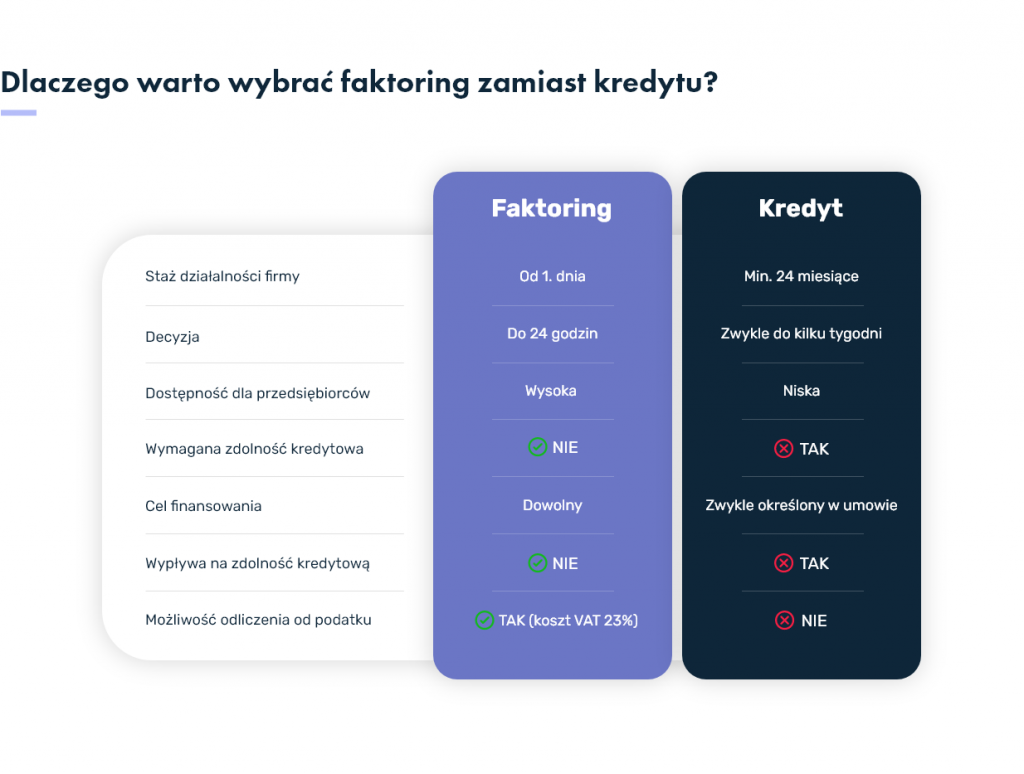Briefly about bank loans
By far the most popular form of business financing, is a bank loan. The Micro, Small and Medium Businesses Report on Financial Services 2019 indicates that the number of companies borrowing has declined in the past year, but almost half of medium-sized companies (46%), and slightly fewer among micro and small businesses (43%), still use this source of financing.
However, the aforementioned report prepared by the Polish Bank Association and CBM INDICATOR contains an important piece of information: a year earlier, 53% of medium-sized companies used loans – a year-on-year decline of 7%. The question that remains in all of this is the popularity (and ease of obtaining) credit in the current economic situation of the country and the world.
Types of credit for enterprises
Companies can take out different types of loans depending on the purpose for which they intend to use the funds raised. And so an investment loan will finance an investment to affect the growth of the company (and thus more revenue in the future). Better loan terms can be obtained by opting for an indicated investment loan, which differs from the previous one in the need to use the funds for a predetermined purpose.
Current expenses, on the other hand, will be financed with a working capital loan, in the form of a revolving or non-revolving loan, or a short-term loan in the form of an overdraft.
Briefly about factoring
Factoring is a financial service that differs somewhat from loans. In this scenario, the entrepreneur does not borrow money from a bank, but resells his receivables to a factoring company, which first disburses the funds to the factor (taking a prearranged commission) and then expects payment directly from the client’s counterparty.
As indicated by the analysis of Sebastian Grabek, chairman of the executive committee of the Polish Factors Association, the turnover of the factoring market is constantly growing (in 2018, the value of turnover amounted to almost 270 billion zlotys, according to the Central Statistical Office). Moreover, even now, despite the coronavirus outbreak, the factoring services market in Poland has recorded double-digit growth (by 13.7% in the first quarter of 2020).
For more on the types of factoring and when it is best to use this service, see the guide: What is factoring and what are its types?
Factoring vs. credit – which to choose?
The basic differences between factoring and credit are several:
- ease of obtaining – in the case of classic factoring, more important than our creditworthiness or the financial condition of our company, is the situation of the debtor. Lenders, in turn, will carefully scrutinize the liquidity of the company requesting the loan to ensure that they can recover the money borrowed.
- speed of decision and access to funds – again, factoring wins out over credit. In emergencies, the factor is able to obtain funds in as little as a few hours after the sale of an invoice, and often one business day is enough. This point connects directly to the previous one, as the easier sale of receivables also speeds up the payment of claims.
- The cost of the service – loans are generally cheaper than factoring. Loan costs are primarily interest, but also include additional fees, such as a preparation fee. Factoring involves charging a commission that depends on the amount owed, in addition to which there may be other fees under different types of factoring – for example, for the service of insuring against debtor insolvency.
- additional services – factoring companies offer customers a range of additional services, such as debt collection, monitoring of receivables or taking over contact with the counterparty. In the case of a loan, we usually do not have such broad options.

Factoring vs. working capital credit
Timing may be key in this mix. A situation in which we are awaiting payment of a large receivable from one of our counterparties, and we have our own obligations to settle, does not give us much time to maneuver. In this case, factoring will be perfect for obtaining funds quickly and easily.
A working capital loan is a one-time activity and the company must apply for each one separately. In the case of factoring, the matter is a bit simpler: after registering with the factoring company’s platform, we can enter the data of our counterparties and then use factoring on a permanent financing basis. This will apply especially when the company is doing business with a counterparty that sets long deadlines for repayment of debts.
The loan is more likely to benefit companies that have been in operation for several years, are able to adequately protect themselves in case of unforeseen complications, and have a long and positive credit history. Factoring, in turn, is a solution particularly favored by young, growing companies, start-ups or freelancers.


